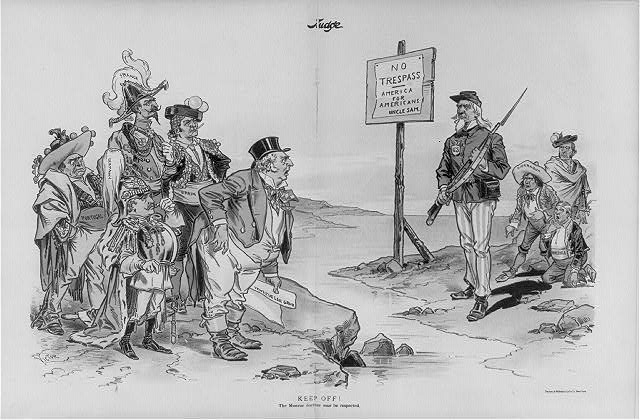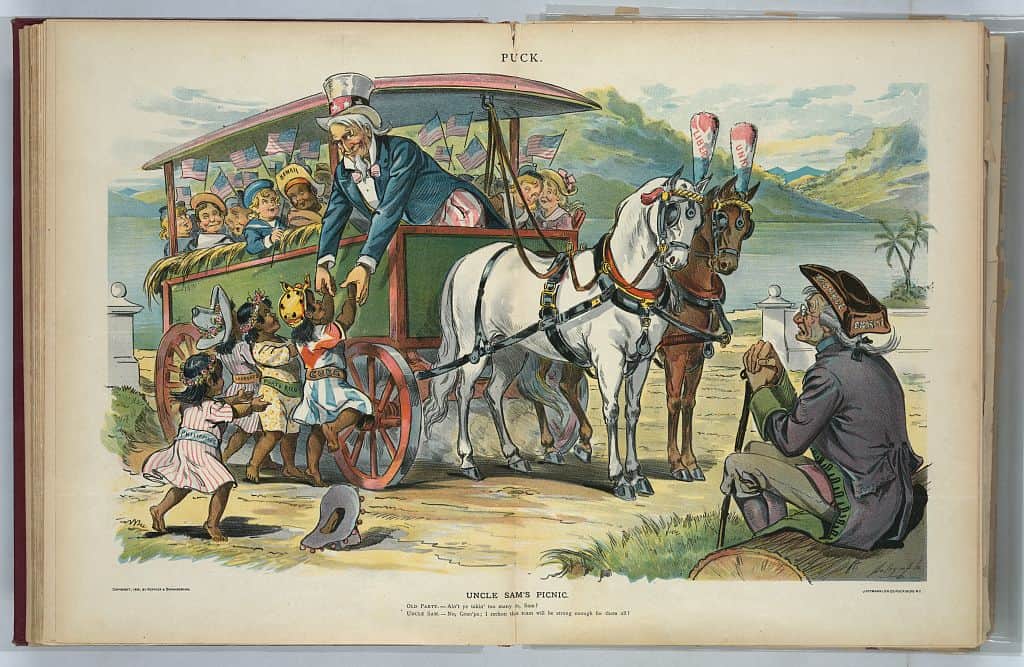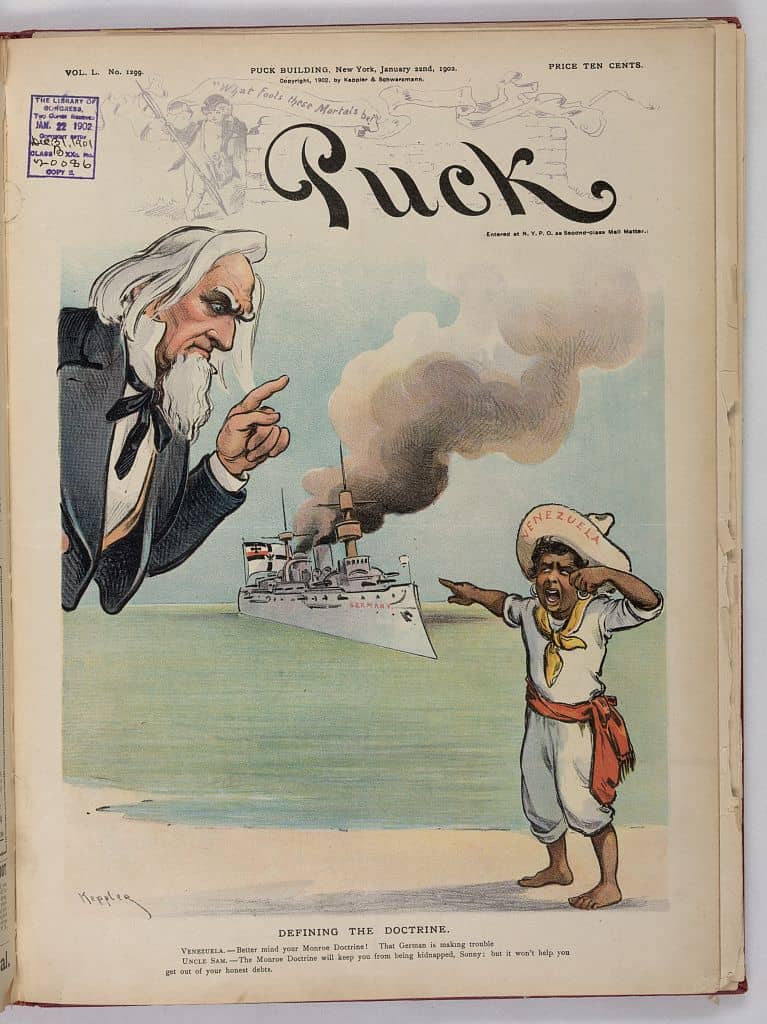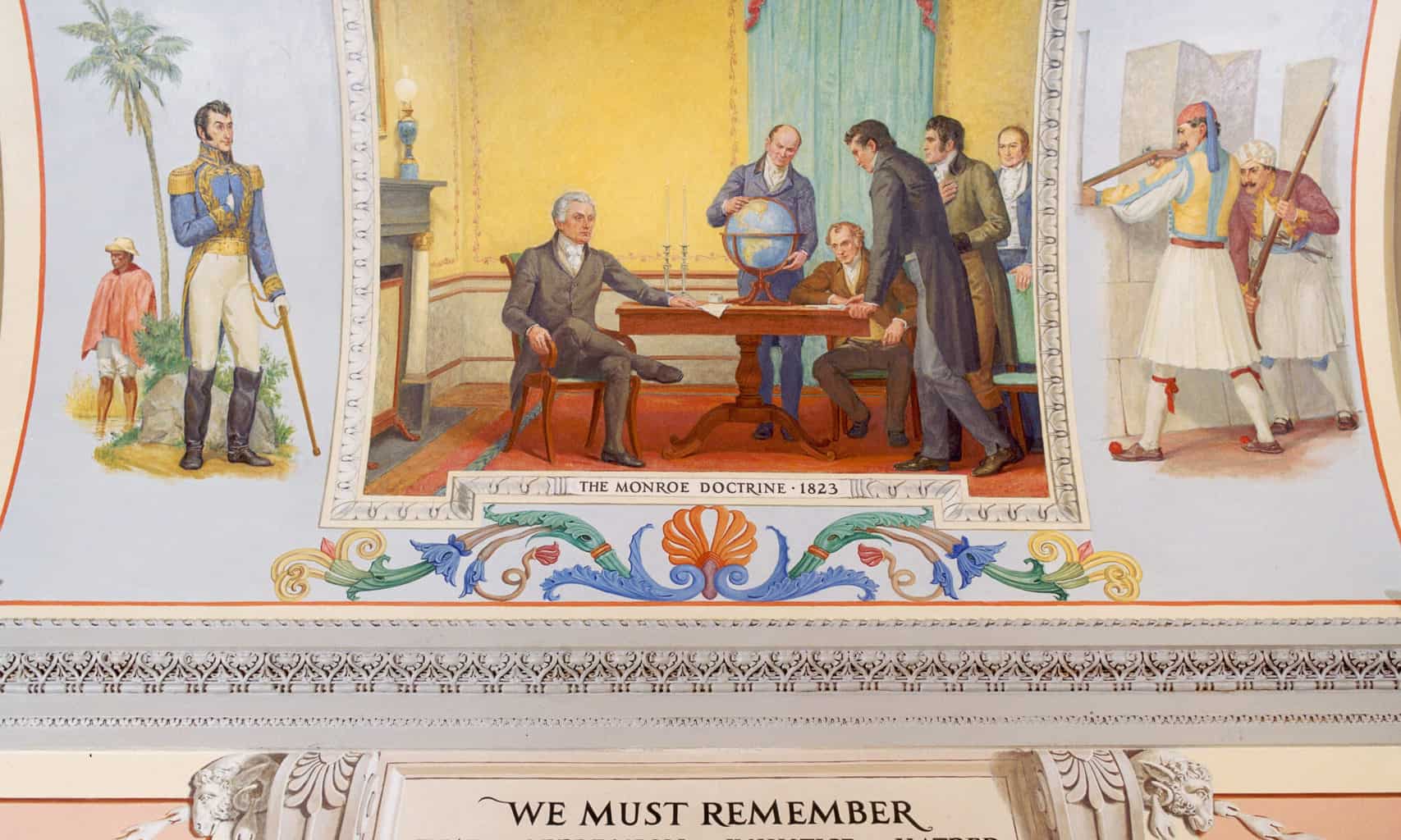Feature Image from flickr
Image 1: Symbols

Title: Keep off! The Monroe Doctrine must be respected
Context: The illustration represents the United States (Uncle Sam as an armed soldier) preventing passage to European Powers (France, Germany, Spain, Britain, and Portugal) into the Western Hemisphere via the Bering Strait . A sign on North America reads, “No Trespass, America for Americans”. Uncle Sam is standing in front of Nicaragua and Venezuela.
Icebreaker prompt: Does the image present any symbols of significance? In what context do these symbols fit in?
Response: One symbol that is worth pointing out is the fact that Uncle Sam is the only person in the illustration holding a weapon. This demonstrates the United States’ willingness to act on nations that disagreed with the Monroe Doctrine.
Another symbolic feature of this illustration is Uncle Sam’s stance between European Powers, and Nicaragua and Venezuela. It appears that Uncle Sam is protecting the Latin American nations from European powers.
Image 2: Questions

Title: Uncle Sam’s Picnic
Context: The illustration shows Uncle Sam in a wagon full of United States citizens (children). The child to most recently have joined the wagon has a hat on labeled “Hawaii”. Uncle Sam is helping four girls labeled “Puerto Rico, Cuba, Phillipines and Ladrones” into the wagon. Two horses labeled, “Liberty” and “Union” are pulling the wagon. An old man wearing a hat labeled, “Monroe Doctrine” is sitting down nearby and asks Uncle Sam: “Ain’t ye takin’ too many in, Sam?” Uncle Sam replies, “No, Gran’pa; I reckon this team will be strong enough for them all!”
Icebreaker prompt: Brainstorm a list of questions and rank them in order of individual curiosity.
Response:
1.) Was the Monroe Doctrine of 1823 declaring that the era of colonization was over? Did the US continue to colonize other parts of the world after the Monroe Doctrine had been disclosed?
2.) At this time the US was declaring that no country should further colonize the western Hemisphere, how did the US justify its own right to further colonize the Western Hemisphere (Hawaii, Alaska, Puerto Rico, etc)?
3.) Did the US aid Latin America in finding democracy?
Image 3: Thought Bubbles

Title: Defining the (Monroe) Doctrine
Context: Caption at the bottom of the image states:
Venezuela – “Better mind your Monroe Doctrine! That German is making trouble.”
Uncle Sam – “The Monroe Doctrine will keep you from being kidnapped, but it won’t help you get our of your honest debts.”
Icebreaker prompt: The subjects in the image are having a conversation. What do you think the subjects are thinking? Create thought bubbles for the subjects in the image.
Response: Uncle Sam thoughts: “I will stay true to my word and oppose European Colonization in the Western Hemisphere, however, Venezuela sure does owe me for this one”.
Venezuelan boy thoughts: “First Spain, now Germany? Who will exploit my people next?”


A well-curated collection of political cartoon featuring the “Monroe Doctrine.” Good section of Icebreaker prompts opens up student exploration into the ways it evolved into a foundation of US foreign policy.
It’s especially interesting that they all come from 1890’s and 1902- just as US was flexing it’s imperialist muscle. By then the doctrine became a justification for our expansionist activity. A point that’s made in your post title.
Super interesting topic, Jacob! I’ve actually had quite a few classes centered around this. It’s interesting how the Monroe Doctrine, while on paper appearing to be fairly noble, ultimately transitioned into a more modern day version of Manifest Destiny. It effectively became a case of “No, you can’t do that… But I can!” when it came to invading different countries, collecting territories, etc. Interesting choice of topic!
Amazing post, Jacob! Your image and prompt selections allow for meaningful critiques and examinations of the Monroe Doctrine. Discussions about how Latin America, as well as the United States, would have hypothetically developed without the Monroe Doctrine would be really interesting! Also, these activities could serve as a springboard to other topics where stronger countries stake large interests in weaker countries, such as Russia and Syria. U.S. history is a weakness of mine, so I always enjoy my classmates’ posts about this subject!
Thanks, Matt! I really like your idea of using activities like these as a spring board for introducing students to global trends and more modern issues!
I really enjoy this Jacob. In these images the US is meant to look noble in comparison to its European peers for its creation of the Monroe Doctrine. Yet we see it for what it is, a hypocrisy. Your use of images shoes how the US may have prevented European interference and the reestablishment of colonial empires in the Western Hemisphere, but that was because the US saw itself as the rightful master of the area and beyond.